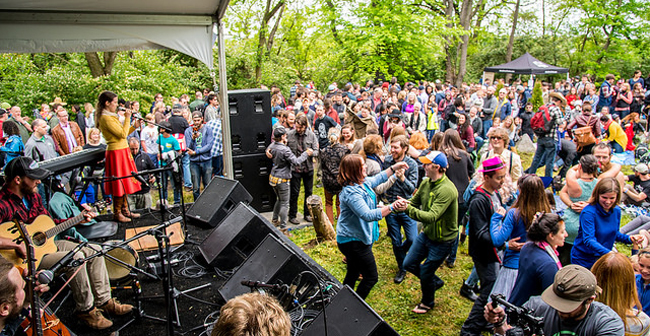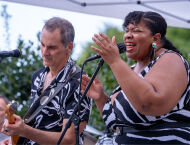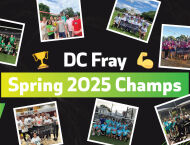Music
 Photo: Mark Raker
Photo: Mark Raker
Celebrating the Past, Preserving the Future at the Kingman Island Bluegrass Festival
May 23, 2018 @ 12:00am
The Kingman Island Bluegrass Festival is returning to DC on June 9. In its 9th year, the festival has grown in popularity annually, and features a wide variety of bluegrass, folk and Americana artist spread across several stages. However, this isn’t your usual for-profit celebration. The Kingman Island Bluegrass Festival helps fund outdoor educational programs that enrich the lives of thousands of kids in the DC area, and puts a premium on environmental sustainability and protecting the island’s rich habitat.
The Kingman Island Bluegrass Festival represents both a celebration of American music and a commitment to protecting our natural lands and wildlife.
Kingman Island (and its counterpart, Heritage Island) were created in 1916 from material dredged out of the Anacostia River. Now just over a century old, you’d never guess they were man-made; the islands are covered in lush green native plants and is home to various wildlife, including foxes, possum and even wild turkey.
Since their creation, the islands have had a long and complex history, and today they remain protected.
While they are owned by the city, Kingman and Heritage Islands are managed by Living Classrooms of the National Capital Region, an organization dedicated to helping kids connect with the natural world.
“We do lessons geared toward orienteering, teambuilding and habitat restoration, including in the Anacostia river,” says Lee Cain, Director of Kingman Island with Living Classrooms. “Between 2,000 to 3,000 kids come to Kingman ever year. We’re trying to make an effort to get kids to make a connection to their local park.”
Cain says another major focus for Living Classrooms is workforce development and helping young people in the neighborhood advance their careers by working on the island. Those enrolled in their summer youth employment program learn native plant identification, habitat restoration and trail work. It’s not just kids who get involved at Kingman.
“Fifteen-hundred volunteers, a year, do trail maintenance, habitat restoration and other things to improve the park,” Cain says.
The bluegrass festival helps Living Classrooms continue its work in Southeast DC and beyond. But it went through some growing pains: “there used to be a ton of trash left after the festival,” Cain says. Organizers put a zero-waste initiative in place, which resonates with many of the festival’s performers.
“They’re trying to be very sustainable,” says musician Crys Matthews, who lives in Herndon, Virginia. “A lot of that stuff is really important to me – I use zero-carbon footprint packaging with all my cd’s, so it’s great to be sharing and creating with like-minded folks.”
Silver Spring musician Dom Flemons agrees.
“It’s something that, on top of being an excellent experience for a musician, is also a very worthwhile cause that they are trying to accomplish with the festival,” he says. “It’s twofold: You have lovely nature, and a reteaching of people in the DC area of how to reconnect with nature and how to really learn sustainability.”
Both Flemons and Matthews are performing at the festival for the second time and taking new steps with their shows.
Matthews is an accomplished musician and songwriter from North Carolina who infuses folk, bluegrass, jazz and other genres into her work. She played last year’s festival solo. This year, she’s bringing her band.
“I’m looking forward to getting to play with them on that stage,” she says. “The space itself is a neat area, nestled and hidden away in the craziness of DC.”
Having been in the area for eight years, “the music scene is pretty incredible,” she says. “It’s very different from back where I lived in the mountains of North Carolina.”
Flemons is a co-founder of the Grammy award-winning Carolina Chocolate Drops, and has traveled around the nation and the world presenting traditional folk and roots music to diverse audiences. He’ll be presenting a new performance at this year’s festival.
“I had this idea for quite a while to present the American Songster review a multi-act program that would feature several different songsters from different parts of the world and the country to be able to present their music,” he says. “It will feature songs they have in their repertoire, as well as one song I will curate and ask them to perform.”
The festival features more than 30 bands playing on five stages this year, as well as an artist market and food trucks. While festivals by their very nature bring high foot traffic and disturbance to the island, Cain says the sustainability measures in place help protect its habitat. Festivalgoers get their own reusable cups, and “80 percent of the waste from the festival is either composted or recycled, and we’d like to get to 90 percent,” he says.
Location is also important: the festival will take place in the island’s most resilient meadows, protecting species like the Virginia mallow, a Maryland endangered plant that can be found on the southern portion the island. Holding the festival at this time of year also gives the plant life the benefit of a full growing season, and thus faster recovery and regrowth afterwards.
The festival, Living Classrooms’ educational programs and the volunteer programs on the island all help raise awareness about this unique oasis in the Anacostia River.
“If we don’t expose people to these resources, they quietly disappear,” Cain says.
The Kingman Island Bluegrass Festival beings June 9. For more information on the festival, islands or tickets, visit here.
Kingman Island Bluegrass Festival: 575 Oklahoma Ave. NE, DC; 202-799-9189; www.kingmanislandbluegrass.info







